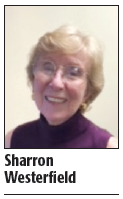In remembrance of Sherron Westerfield
Published 12:00 pm Sunday, February 18, 2024
Editor’s note: A long-time writer and columnist for the Advocate-Messenger, Sherron Westerfield passed away on January 21. Westerfield wrote articles and columns for the Advocate-Messenger off and on over the course of 20-plus years. She enjoyed writing about her experiences, reflections, and documenting her family’s history.
From the news staff at the Advocate-Messenger, we send our condolences to Westerfield’s family and friends. We thank Westerfield for her years of writing and her dedication to the paper.
In remembrance, below is a previously-published column that Westerfield wrote about genealogy and her family history.
What’s in a name?
If you’ve ever done any genealogy research on your family, it is likely that you have come across names that continue through several generations. Many times such names are so distinctive as to give us a clue to our kinship with other family lines. There are also names we discover that originated directly from the pages of history rather than from an illustrious ancestor.
The Demarest/Demaree branch of my family has been traced back far enough to include three generations of Knights of The Crusades. Those were men so committed to their Catholicism that they risked everything in their efforts to reclaim the Holy Lands from the Muslims. Imagine then the family’s turmoil a few generations later when a kinsman declared himself to be Protestant.
To avoid persecution, he fled France with his family and settled in London, England. Thereafter, they bore the label of “Huguenot” and intermarried with Sohier and de Ruine families, who were also French Huguenots. Names of children in subsequent generations came not from their noble French ancestry but rather from the Christian Bible: David, Samuel, Daniel, John, Peter, Judith, Sarah, Magdalena. As those children intermarried with my Dutch ancestors the names of children for the next several generations often reflected that Dutch heritage: Antjen, Peter, Annatje, Ragel, Jacobus, Joost.
Other branches of my family – including Letton, Howard, Bradley, and Robbins – had been Catholic or Anglican Church of England when they came to America and settled in the predominantly Catholic colony of Maryland. In this land of religious freedom, beginning in the early 1800s the names of children in those families, as well as in many others, indicate a conversion to the Methodist faith.
The names “Asbury” and “Francis Asbury” appear no doubt to honor Francis Asbury (1745-1816), the first Methodist Bishop in the United States. The names “Wesley” or “John Wesley” were also popularized and clearly were chosen to honor the founder of Methodism, who died in 1791. Those names can also be found among my paternal Wagoner cousins whose German ancestors had been Lutheran when they arrived in America.
In my paternal Westerfield and Marrs families I noticed a repetition in the late 18th Century and early 19th century of the name Francis Marion long before the two families were related in any way. I came across the same name in other families while going through old census records and realized I needed to find out who “Francis Marion” was. I learned that he was a leader in the American Revolution whose daring deeds in his home state of South Carolina earned him the nickname of “The Swamp Fox.” He and his men repeatedly darted out of the marshes to attack the British and Americans who supported them and disappeared before their victims could retaliate, I now wonder whether some of Mel Gibson’s character in the movie “The Patriot” may have been based on the exploits of the brave and daring Francis Marion.
Many of our ancestors bore as their first and second names the names of leaders and heroes from colonial days through the Civil War:
Andrew Jackson, Benjamin Franklin, Thomas Jefferson, George Washington, Lafayette, Henry Clay, William Rosecrans (a Union General), and even David Crockett. The choice was endless and selected names can be assumed to reflect the sentiments of a child’s parents.
One name that stands out more than others in many families in the late 1700s and early 1800s is that of Lorenzo Dow. You may have come across that name or variations thereof in your own family research. I’ve also seen the feminine versions of Lourenza, Lorinsa, and Laurinza. I even found one incident of a boy named Lorenzo Dow Dow. Now that’s redundant redundant! At first I wondered whether there was some familial connection, some common ancestor for all those babies. Quite by accident I discovered that not to be the case when I met a woman with a Lorenzo Dow ancestor who shared with me her history of that name.
Lorenzo Dow was a charismatic, eccentric, and wildly popular itinerant preacher who roamed all 17 of the States of the Union that existed in his time. He preached to large crowds who were curious to hear him. They in turn fed and sheltered him. Lorenzo was born in 1777 in Connecticut and died in 1834 in Washington, D.C. He and his wife had only one child who unfortunately died young. Lorenzo Dow left no blood descendants. I am left to wonder what would so move an expectant young couple in Lorenzo Dow’s audience that they would later honor him by naming their baby for him?!
You may recall an old movie staring Burt Lancaster as “Elmer Gantry,” a fiery evangelist. Perhaps that character was a little like Lorenzo, with the exception of Gantry’s vices so vividly portrayed by Lancaster?
Lorenzo Dow is credited with being the first gospel minister of the Protestant faith whose voice was heard in Alabama and Louisiana. In Kentucky Lorenzo preached to large crowds gathered in fields or churches in Bardstown, Frankfort, Lexington, and Covington. Dow began his ministry as a Methodist although he was never ordained. Nevertheless, he was a tireless and effective evangelist. He often rode his horse more than 50 miles and preached five sermons in a single day, in addition to leading several classes. His earnestness and zeal earned him the respect of people wherever he went and in return he accepted their food and shelter. However, he was known for refusing money or gifts, saying, “The next preachers invite home and treat well, for my sake.”
I could write more at length about the life and travels of this remarkable man but that is fodder for another article, another time.
In something as simple as determining the origin of a name you will get a glimpse of the attitudes and beliefs of a child’s parents and the times in which they lived. It is in knowing our history that we can truly appreciate our history.






